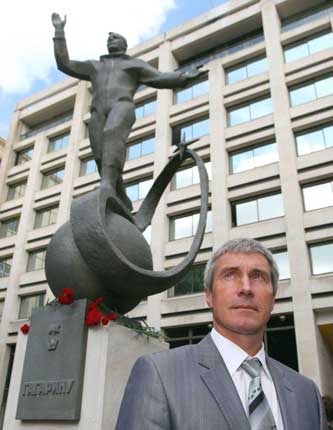US mustn't give up on space or China will move in, says marathon cosmonaut
Sergei Krikalev believes in a starry future

Your support helps us to tell the story
From reproductive rights to climate change to Big Tech, The Independent is on the ground when the story is developing. Whether it's investigating the financials of Elon Musk's pro-Trump PAC or producing our latest documentary, 'The A Word', which shines a light on the American women fighting for reproductive rights, we know how important it is to parse out the facts from the messaging.
At such a critical moment in US history, we need reporters on the ground. Your donation allows us to keep sending journalists to speak to both sides of the story.
The Independent is trusted by Americans across the entire political spectrum. And unlike many other quality news outlets, we choose not to lock Americans out of our reporting and analysis with paywalls. We believe quality journalism should be available to everyone, paid for by those who can afford it.
Your support makes all the difference.The manned exploration of space is one of the defining achievements of humanity and should not be abandoned in favour of less expensive robotic missions after the Nasa Shuttle's last flight, the man who has spent the most time in space said yesterday.
The Russian former cosmonaut Sergei Krikalev said that suggestions that the age of manned space exploration should end – with the demise of the Shuttle programme, and US President Barack Obama proposing a freeze on Nasa's budget until 2016 – are misguided because robots and space probes will continue to be poor substitutes for human space explorers for many years to come.
Mr Krikalev, who holds the record for the most amount of time spent in space – a total of 803 days, 9 hours and 39 minutes – called for future manned missions to the Moon and even Mars, saying that they would open up a new age of human exploration akin to the discovery of the New World by Christopher Columbus in 1492.
"Columbus had a business plan to bring back spices from India, but it changed after he discovered America," Mr Krikalev told The Independent, speaking 50 years after Yuri Gagarin's pioneering Earth orbit in 1961. "If you ask me does it make any sense to go to the Moon and beyond, sure it does. I'm sure there will be benefits from going beyond our habitable area to learn and study space.
"The end of the Apollo programme did not mean the end of human space flight. The same is true with Shuttle. The end of Shuttle does not mean the end of human space flight. It's the end of one programme, but another programme will take its place."
A return manned mission to the Moon could be organised in less than 10 years if there was a political will on behalf of the major space nations, Mr Krikalev said. If America or Russia does not take a lead, it could be done by China which has become a serious player in space since launching its own manned rockets.
Some scientists have argued that manned space flight is an expensive luxury and that intelligent probes and robots could explore the Solar System far more efficiently at a fraction of the cost. One of President Obama's first decisions on coming to office was to abandon plans for the United States to return astronauts to the Moon and there are no definite plans to replace the Shuttle with another re-useable manned vehicle.
Mr Krikalev, who attended the unveiling of a Gagarin statue outside the British Council offices in London yesterday, said that intelligent space probes and robotic explorers will never be as good as humans for many years to come and that to stop or curtail manned missions now would be a set back for space exploration.
"I would argue with the statement that sending people into space is more expensive than sending robots. Sending robots can be very expensive and what is really important is the ratio between expense and result. If you have zero result, it doesn't matter how much you spend," Mr Krikalev said.
"A good example is the Hubble space telescope. Even though it cost billions of dollars, if people had not gone to fix it when they realised it was broke, the result would have been close to zero. The best combination is humans and robotics."
Mr Krikalev, who now heads the Gagarin cosmonaut training centre at Star City near Moscow, was once called "the last citizen of the Soviet Union" when in 1991 and 1992 he spent 311 days on board the Mir space station as part of an extended mission that coincided with the breakup of the former USSR.
"It was a radical change, but we didn't feel it was the dissolution of the country. Russia has been Russia for many centuries. I departed from Russia and I went back to Russia," he said.
"I know about all these stories that ground control forgot about us in space and could not return us, but this was not true."
Join our commenting forum
Join thought-provoking conversations, follow other Independent readers and see their replies
Comments